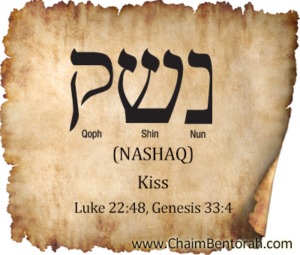Aramaic Word Study – Kiss – Nashaq – Nun Shin Qop
Luke 22:48: “But Jesus said unto him, Judas, betrayest thou the Son of man with a kiss?”
Genesis 33:4: “And Esau ran to meet him, and embraced him, and fell on his neck, and kissed him: and they wept.”
 The word kiss in Aramaic is nashaq which means to draw close and touch. It is a word used for kiss but the idea is the act of touching. The purpose of the kiss depends upon the cultural use. First a little of the back story behind the betrayal of Jesus.
The word kiss in Aramaic is nashaq which means to draw close and touch. It is a word used for kiss but the idea is the act of touching. The purpose of the kiss depends upon the cultural use. First a little of the back story behind the betrayal of Jesus.
Historically it was not uncommon for heretics to be arrested and tried before the Sanhedrin. If the heretic had loyal followers someone among his followers would identify himself as the teacher in order to prevent his master from being arrested so the teacher/leader would have a chance to escape. By the time the authorities realized that they had been bamboozled and that they arrested the wrong person, the teacher/leader would be a long way away. With Jesus so willingly giving Himself up it had to create suspicion among those arresting Him that this was not the guy they were seeking. Without smartphones, internet, and other sources to call up a picture, plus it being dark outside they would need some sort of proof that this was indeed the man they were seeking. So it took an eyewitness to make the identification and that was Judas with his kiss.
Why did Judas use a kiss to identify Jesus, why not just point to Him and say, “That’s Him, I spent three years with Him, I can definitely identify him in any lineup. The Bible tells us that Judas betrayed Jesus with a kiss. When I hear the word betrayed I think of being double-crossed, sold out, backstabbed, sold down the river. The strange thing about this is that Jesus knew all along Judas would betray Him. In fact, from the moment he invited Judas to join his study group, He knew Judas would betray Him. So why was He so surprised or/an accusing Judas? Judas was only playing the role he was supposed to play. I hear the words: “Judas, betrayest thou the Son of man with a kiss?” I get the feeling that Jesus is saying: “Judas, how could you, after all, we have been through, after all I have taught you and now you do this? For shame, for shame.”
In the Greek the word used for betray is paradidomi which simply means to hand over, to deliver, or abandon. However, Jesus spoke this in Aramaic and the word he used was mashalam from the root word shalom. Shalom means peace and/or completion. So what Jesus likely conveyed to Peter was not a rebuke, “You traitor you, you betrayed me” but a simple statement of fact. “With a kiss, you bring the Son of Man closure, completion of His ministry.” With the Mem as a preposition, you could adjust the syntax a little as this seems to convey more of the idea of; “With a kiss the Son of Man will bring peace to the world.”
Still, that does not answer why Judas had to identify Jesus by a kiss. A kiss does not always signify exactly the same thing among different cultures. In our Western culture kissing among strangers or friends is sort of frowned upon or awkward as it is generally associated with eroticism. Yet, in many cultures kissing is not always erotic.
In the Roman Empire during the first century when Judas delivered his wet one, kisses fulfilled purposes from political, legal, social, and sexual. For instance, the status of a Roman citizen determined the part of the body on which he or she could kiss an authority figure. This would run from the cheek to the foot. Scripture seems to indicate Judas kissed Jesus on the cheek. This would indicate that he was putting himself on the same level or even above Jesus.
In a period where there was widespread illiteracy kisses were used to seal an agreement and then marked with an X. That seems to be the origin of the X to represent a kiss. The Romans also introduced the practice of a couple kissing at the end of a marriage ceremony. This seems to have its origin in the Aramaic word for kiss which expressed ownership as in the sealing of an agreement. In the first century, a slave owner would kiss the slave upon purchase to convey his ownership over the slave. The couple in marriage would kiss each other on the lips to express the idea of equality in this ownership. He owns her and she owns him, they are as one.
Esau kissed Jacob on the neck as did Joseph kissing his father’s neck and the father kissing the prodigal on the neck. To kiss on the neck in ancient times was one of the most symbolic kisses as this is where the carotid artery lies and it was not unusual in an attack to bite into the artery causing the victim to bleed to death. To allow someone to kiss your neck was an act of trust. For Jacob to allow his brother Esau to kiss him on the neck was a sign of ultimate trust in this brother whom he believed hated him and wanted to kill him. In fact, the word bit in Hebrew is nashak which sounds almost identical to the Aramaic nashaq and is closely related to shaqah which is the Hebrew word for kiss and cognate to the Aramaic word nashaq. In fact, some Jewish commentators indicate that Esau originally intended to bite Jacob’s neck but changed it to a kiss when he realized his brother was submitting himself to him to either bless him or kill him. Yet, there are a series of six dots above the word shaqah in this passage speaking of Esau kissing his brother. Hebrew scholars teach that these dots are like quotation marks to indicate that his kiss was not sincere.
Why did Judas use a kiss to identify Jesus? We can only guess and speculate. I would suggest, for your consideration only, that Judas did not kiss Jesus on the feet to show submission to Him, on the lips to show a oneness with Him nor on the neck to show intimacy with him but on the cheek which was the least invasive and symbolic gesture. In fact, to kiss on the cheek was like kissing on the forehead. A slave owner would kiss his new slave on the forehead or cheek to declare his superiority and ownership over that slave. In fact, to kiss on the forehead or cheek was almost a sign of patronizing someone. Maybe Judas was saying, “You are really not the Messiah, just another kind-hearted teacher who is leading everyone to think you are something you are not and I don’t have to follow your teaching.”
Today we have many church leaders, pastors, and religious teachers who are kissing Jesus on the forehead or cheek literally saying: “You’re a nice guy, Jesus, but you have no authority over me. I will do and teach what I think is right.” The media is filled with stories of pastors and religious teachers saying that we need to update the words of Jesus. The things He taught just do not apply to our enlightened society and culture today. Arrogantly and patronizingly patting Jesus on the head saying: “You’re a nice guy but I’ll take it from here for I am enlightened in this modern age.” The Judas kiss is happening every day in our modern age.
Hi there! Thank you for reading this Daily Word Study. Can I ask a favor? Share this Daily Word Study with your friends on Facebook and Twitter by clicking one of the icons below.
Thanks & Blessings, it means a lot to me!








Who knew a kiss could mean so many things!!!
Thx again Chaim, inspires me to go deeper in the scriptures again!
So good to ponder. Thank you for your study and writing.
Yes and amen brother.🙏👍🤔🙂. Praying for Israel and surrounding countries. Everything that happens in Israel I believe effects the whole world!
The worst is that I witnessed your conclusions but unable to crystallize what is really happening.
I have no words.
Never heard any of this.
I am enriched and cautioned beyond ….
Thank you for this teaching and the understanding it has given me.